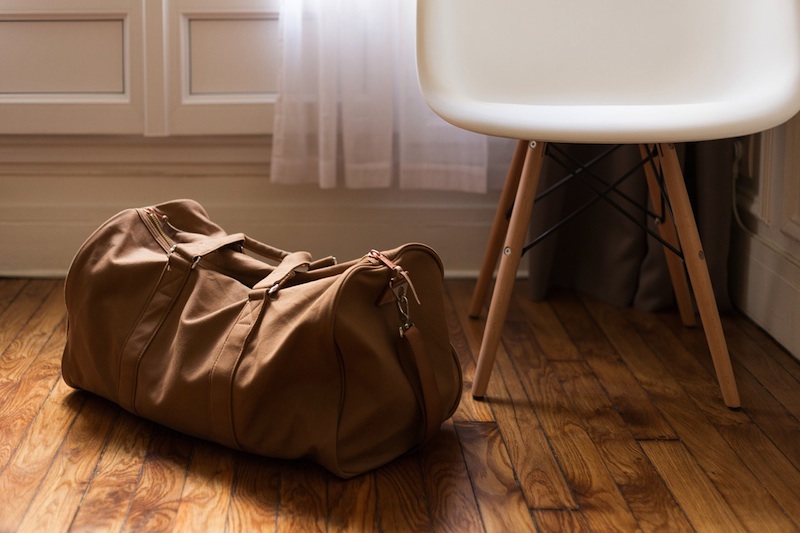
Stefania is a dear friend of Expatclic. After four years in India, she went back to Italy, her home country. In this beautiful article, she shares the complex feelings that accompany the repatriation phase. Thank you, Stefania.
Upon returning home, I am at the supermarket, standing in front of the yogurts shelf. All around me, people hurry, they stop just the few seconds necessary to pick up their jars of choice, put them in the shopping cart and move on, concentrating on the next item on their lists. I can’t focus very well, not only on where I am looking at but also on what I am looking for. The number of different brands and the variety of different flavors available in each one brand are blowing my mind: I didn’t even know there was tea flavored yogurt!
I am not in an unknown town, at my first grocery shopping experience. I am at home, in the same supermarket where I have shopped thousands of times before leaving for my expatriation four years ago. Simply, I am not used to this variety: where I have lived for the past four years there were two yogurt brands, maybe four flavors in all. It took me one minute to chose.
Here everything looks different, the simplest actions require my full attention and more time. My autopilot, that should take over in repetitive situations like grocery shopping, is failing me. I feel like a foreigner although I am at home: I am in the middle of Reverse Culture Shock.
Before returning home, I wasn’t really sure that it even existed. I was telling myself: forget it, expatriation has been a parenthesis, I spent the longest part of my life at home, it’s going to be like being back from a holiday.
Yes and no.
 We all went through Culture Shock when we moved to a new country. Experts identify different phases that constitute it, from the highs of the novelty to the lows of homesickness, to the balance reached with difficulties after months or even years. These emotional ups and downs have been graphically represented as a wave or a W.
We all went through Culture Shock when we moved to a new country. Experts identify different phases that constitute it, from the highs of the novelty to the lows of homesickness, to the balance reached with difficulties after months or even years. These emotional ups and downs have been graphically represented as a wave or a W.
It is through similar phases and similar emotional ups and downs that Reverse Culture Shock happens when we go back home for good. This is when we cross the line: we are conscious that it is not a vacation, it is not a break, there is no count down to a new departure. Here is where we have to stay and adapt; the fact that it used to be our home years ago doesn’t count much. Actually, one tends to underestimate the effort one needs to put into it.
At first, meeting relatives and friends, being at home, slipping back into old habits is a comfort, known by definition as the “honeymoon stage”. Maybe we can even be a bit harsh in the comparisons we make with what has been our host country, we breathe easily, we tell ourselves: ah, here I can relax, here everyone understands me, here I can drive/wear/eat whatever I like. Or simply, if we arrive back home at the same time we usually had holidays in the past, we don’t even immediately realize that this time we are home to stay.
There are many little habits, hidden everywhere, that we picked up while abroad for a long time
Later on, though, when months go by, we become restless: what a nuisance that the car in front of me turns without using the blinkers. Do miniskirts in the summer have to be this short? Colors in the fall are amazing, the bad part is getting used to coats and scarves again. It bothers me that people jump in before I finish talking. Can ginger really be this expensive? Is it really possible that there are so many yogurt brands that I have to spend half an hour choosing from them?
 The time needed to feel back in our shoes may be long – three, six months, sometimes one year: it very much depends on how different is the reality where we lived in expatriation and how long we have been away. A longer period of time abroad results in a bigger number of changes, inside and around us.
The time needed to feel back in our shoes may be long – three, six months, sometimes one year: it very much depends on how different is the reality where we lived in expatriation and how long we have been away. A longer period of time abroad results in a bigger number of changes, inside and around us.
I first suspected that something felt weird last summer, when I was crossing the road on the zebra crossing: I lifted my hand and looked sternly into the eyes of the approaching driver, although he was slowing down to let me cross. Within me, I still had the crazy traffic of my host country.
And even the most sophisticated social network could not have let us live the daily home life while we were immersed in a parallel daily life far away.
There are many little habits, hidden everywhere, that we picked up while abroad for a long time. They sneaked into us and built that supplementary software that gave us the skills to survive where we were. But when we are back “home” and they spring up automatically, they can surprise us and make us laugh or reflect. Or they can simply make us see things more complicated than we remembered them.
Sometimes our new habits can make some eyebrows rise among relatives and old friends; they are happy to see us back and don’t quite make sense of our “awkwardness”. It’s when we see surprise and wonder in their eyes that we realize the shift that our behavior has made, compared to the “norm” of the place. It’s inevitable: many things have happened while we were away, both to us and to our friends and relatives at home. And even the most sophisticated social network could not have let us live the daily home life while we were immersed in a parallel daily life far away.
Any event has an influence upon us and can make us change. Therefore, the first step to take is accepting that “home”, in the broad sense of a place of things and people, is not exactly how it was when we left. Also because it’s us, in the first place, who are not the same we used to be.
…everything looked the same, while she felt like a new person
What’s unsettling is that, when one goes back home, one would not expect to have adaptation problems: it’s, after all, home. But the more time we spent away, the more distant from ours is the culture of the country where we lived, the more effort we put to get used to the host Country, the more we are going to feel Reverse Culture Shock.
 All the women I spoke to, once they went back home after an expatriation, confirmed that they have felt like a fish out of water at some point or another.
All the women I spoke to, once they went back home after an expatriation, confirmed that they have felt like a fish out of water at some point or another.
Relationships and acquaintances at home are more, in number, but not as deep as those among expats, when sharing strong experiences builds strong friendships.
There are habits they forgot existed, or others that had changed in the meantime: even just talking about a TV show that it is so popular and that we have never even heard about, living on the other side of the world. Someone said that everything looked the same, while she felt like a new person.
The majority, in order to get back on track, delved into work. Those who went back to their old job needed some time to get the rhythm back. Others started a new professional experience, maybe adding on something they had learned while away. A small number preferred to absorb the change taking some time off to put old issues, family, financial, estate, which had been on hold for so long, back in order. No one said that coming home has been free from obstacles and reflections.
Let’s take the time we need to metabolize our farewell to the host Country
Expat women are used to going from a survival state to a life full of satisfactions at any given latitude, and they have the resources to thrive also during repatriation.
We only need to realize we have to treat it a little bit like expatriation. With a sense of humor, the best antidote to any travel inconvenience. It helped us adapt to our host country and will help us overcome the re-entry. With patience, giving us the time we need to get back into the old persona we were or to create a completely new one. With the solidarity of other women who went through the same experience before us and can help compare notes.
Let’s enjoy the big and small pleasures that we missed when we were away. For me, for instance, biting into an apple I have just run under tap water, with no need of further sterilization.
Let’s take the time we need to metabolize our farewell to the host country. There are going to be times when a smell, a sound, a face will bring it back to us; others when doing something we learned abroad, a recipe, a game, a dance step, will make us feel how enriching the expatriation experience has been.
And let’s laugh out loud when we realize we don’t use our left hand anymore to bring that pizza slice to our mouth or to hand out something; or when we are the only ones to take off our shoes when entering our friends’ home.
Stefania Scardigli
Italy
February 2016
Thank you Susan Scales for proofreading




